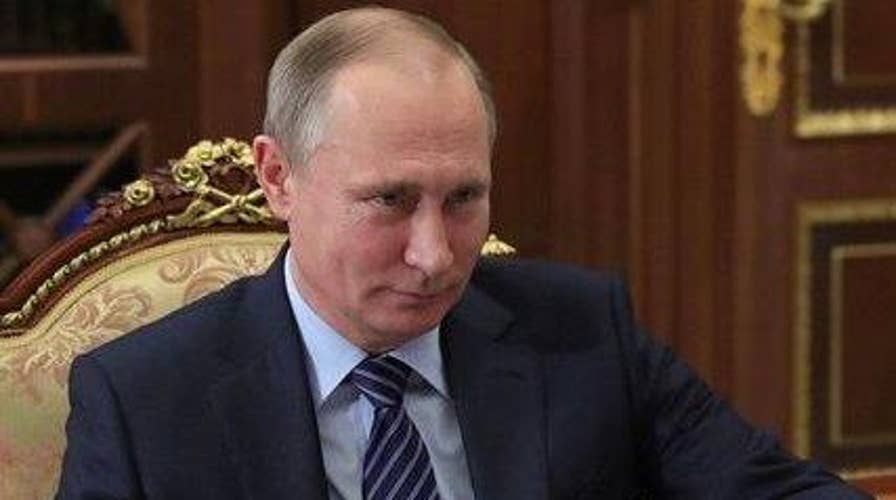New developments on CIA's Russia hack assessment
Catherine Herridge reports from Washington, D.C.
Sunday, President-elect Donald Trump slammed the Central Intelligence Agency’s analysis of Russian meddling in the 2016 campaign. Fingers are pointing in all directions, with a bipartisan group of Senators demanding a full investigation, while the FBI and CIA can’t seem to agree on the severity of the threat – or if there was one at all.
Lost in the back and forth is a levelheaded examination of how we got here, and what to do next. Indeed, how we manage this issue will speak less about the Russians and more about the health of our democracy – and our ability to move forward.
Mr. Trump and President Obama agree on one thing: the 2016 election results accurately represented the will of the American people. Our voting machines were not hacked. Jill Stein’s recount will prove nothing.
Still, most reasonable people agree that Russian spies and hackers were engaged in a covert influence campaign. This should come as a surprise to no one. The dark arts of espionage are used by every nation, every day.
Trump is smart to emphasize that we can – and should – have a different relationship with Russia. The foreign policies of the past two presidents have not helped us deal with Moscow to our mutual benefit. At the same time, it’s clear that Russia is no friend.
As a former CIA ops officer, I believe that President Putin – a former KGB spy – had a mission: sow anger and doubt amongst the American people about our political system and our politicians.
Why would Moscow do this? Three reasons:
1. Global Order. From Putin’s perspective, the past 15 years have been a nightmare for global order. He believes that President Bush’s war in Iraq was a disaster, resulting in the spread of terrorist groups like ISIS and their Saudi ideology, Salafi Islam. Clinton backed this war.
Next, Western nations and their leaders – including Clinton – managed to kill the Libyan dictator Muammar Gaddafi but failed to stick around to rebuild. The result is an Arab state in flames and a new safe haven for ISIS. In Syria, Putin saw Clinton advocating for more of the same.
2. Ukraine. The Russians were deeply angered by American and European attempts to bring Ukraine into the European Union. Historically, the country had been under Soviet – and later Russian – control. To Putin’s mind, taking Ukraine from his orbit was as if Russia had grabbed Hawaii from ours.
3. Revenge. Putin is driven by pride, ego, and revenge, namely because he views the collapse of the U.S.S.R. as a tragedy; he wants to make Russia great again. That means taking down his old enemy – the United States – and weakening neighboring countries. Putin wants global power and influence at our expense.
Irrespective of Russia’s motivations, we cannot tolerate foreign interference in our elections. It doesn’t matter your political party or preferred candidate.
Yet a collection of new facts and analysis around Russian activity will likely not answer the most pressing question: did the covert influence operation result in Trump’s election? The honest answer will almost assuredly be “we don’t know.” It’s very difficult to prove that these kinds of operations work.
How difficult? Just ask the British.
In the years preceding our entrance into World War II, U.K. Prime Minister Winston Churchill was desperate to involve the United States – and our military – in the fight against the Nazis. At the time, neither President Roosevelt nor the American people were in any mood for war. In response, Churchill launched a covert influence campaign blandly called the British Security Coordination. Starting in 1940, the British invaded American eyes and ears with propaganda to send our children to war.
Did it work? To this day, historians aren’t certain. The bombing of Pearl Harbor seems far more likely.
To be sure, Putin is no Churchill, and Russia is no Britain. The analogy falls short when considering Russia’s treatment of journalists, critics, and minorities. It’s also clear that they’re targeting civilians in the Syrian war and Ukraine crisis.
Still, it’s unlikely that anyone will prove Russian meddling was ultimately responsible for electing Trump. It’s far more likely that Obama’s initial assessment was right: the American people made their own decision. Accordingly, we must focus on our path forward.
Trump is smart to emphasize that we can – and should – have a different relationship with Russia. The foreign policies of the past two presidents have not helped us deal with Moscow to our mutual benefit. At the same time, it’s clear that Russia is no friend.
In order to strike the right balance, Mr. Trump will have to work closely with members of the intelligence community. Regrettably, the President-elect has made that process more challenging given his incendiary remarks against the hardworking spies at Langley. Even still, these men and women are professionals and will salute him as their commander in chief regardless.
More broadly, all Americans would do well to avoid partisan anger and heated rhetoric on the Russia dispute. If we don’t, we will only fall further into Putin’s trap of anger and doubt. We ought to instead embrace the ethos of our British friends: Keep Calm and Carry On. It was a mantra – and piece of propaganda – that helped guide that nation through its darkest days of WWII. We would be wise to adopt it once again.





















